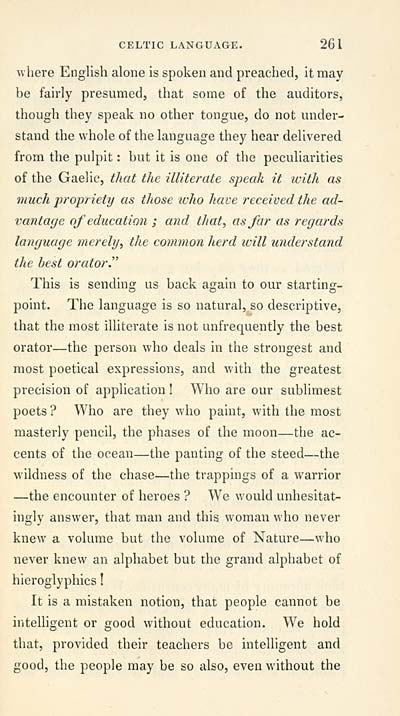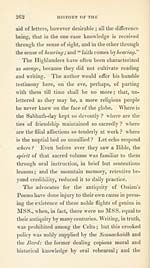Download files
Complete book:
Individual page:
Thumbnail gallery: Grid view | List view

CELTIC LANGUAGE. 261
where English alone is spoken and preached, it may
be fairly presumed, tliat some of the auditors,
though they speak no other tongue, do not under--
stand the whole of the language they hear delivered
from the pulpit : but it is one of the peculiarities
of the Gaelic, that the illiterate speak it with as
much propriety as those tcho have received the ad-
va7itage of education ; and that^ as far as regards
language merely, the common herd will understand
the best orator."
This is sending us back again to our starting-
point. The language is so natural, so descriptive,
that the most illiterate is not unfrequently the best
orator — the person who deals in the strongest and
most poetical expressions, and with the greatest
precision of application ! Who are our sublimest
poets ? Who are they who paint, with the most
masterly pencil, the phases of the moon — the ac-
cents of the ocean — the panting of the steed — the
wildness of the chase — the trappings of a warrior
— the encounter of heroes ? We would unhesitat-
ingly answer, that man and this woman who never
knew a volume but the volume of Nature — who
never knew an alphabet but the grand alphabet of
hieroglyphics !
It is a mistaken notion, that people cannot be
intelhgent or good without education. We hold
that, provided their teachers be intelligent and
good, the people may be so also, even without the
where English alone is spoken and preached, it may
be fairly presumed, tliat some of the auditors,
though they speak no other tongue, do not under--
stand the whole of the language they hear delivered
from the pulpit : but it is one of the peculiarities
of the Gaelic, that the illiterate speak it with as
much propriety as those tcho have received the ad-
va7itage of education ; and that^ as far as regards
language merely, the common herd will understand
the best orator."
This is sending us back again to our starting-
point. The language is so natural, so descriptive,
that the most illiterate is not unfrequently the best
orator — the person who deals in the strongest and
most poetical expressions, and with the greatest
precision of application ! Who are our sublimest
poets ? Who are they who paint, with the most
masterly pencil, the phases of the moon — the ac-
cents of the ocean — the panting of the steed — the
wildness of the chase — the trappings of a warrior
— the encounter of heroes ? We would unhesitat-
ingly answer, that man and this woman who never
knew a volume but the volume of Nature — who
never knew an alphabet but the grand alphabet of
hieroglyphics !
It is a mistaken notion, that people cannot be
intelhgent or good without education. We hold
that, provided their teachers be intelligent and
good, the people may be so also, even without the
Set display mode to: Large image | Transcription
Images and transcriptions on this page, including medium image downloads, may be used under the Creative Commons Attribution 4.0 International Licence unless otherwise stated. ![]()
| Early Gaelic Book Collections > Blair Collection > History of the Celtic language > (267) |
|---|
| Permanent URL | https://digital.nls.uk/76181546 |
|---|
| Description | A selection of books from a collection of more than 500 titles, mostly on religious and literary topics. Also includes some material dealing with other Celtic languages and societies. Collection created towards the end of the 19th century by Lady Evelyn Stewart Murray. |
|---|
| Description | Selected items from five 'Special and Named Printed Collections'. Includes books in Gaelic and other Celtic languages, works about the Gaels, their languages, literature, culture and history. |
|---|

